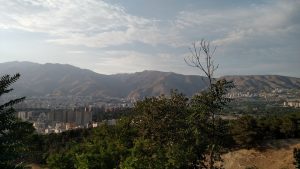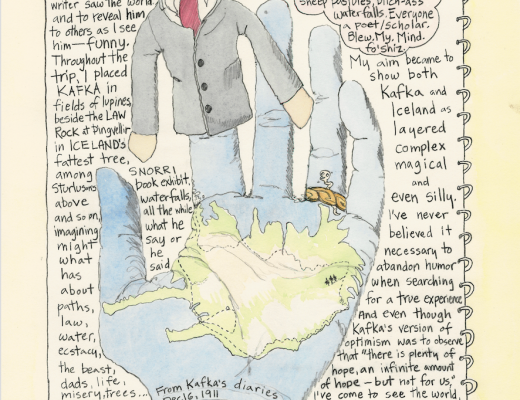Lesser Than
I am five.
I clasp the sleeve of my father’s coat tightly as we weave our way around the small, round tables on my first day of kindergarten. At a table towards the back, there’s a name tag with block letters I am beginning to recognize, S-A-D-A-F. My dad tells me to sit here and he leaves. I watch all the other kids file in and sit by their own name tags so I don’t have to watch my dad walk away. After every little chair has been filled, our teacher asks us one by one to say our names. Saa-daf, I say, easing into the first “a,” pronouncing it the way you would a smile. Sodoff, she says, brief, staccato. Sadaf, I say again, emphasizing the long “a.” Yes, Sodoff, she repeats incorrectly and ticks something off on her paper with her pencil. I become Sadaf at home, Sodoff in school. It is easier to be split into two people instead of insisting on being one.
I am eight.
I help my mom study for her citizenship test. I cut index cards into two halves. I number one side of each card 1 to 27 and on the other side, I write out the corresponding amendment, not understanding all the words, but carefully copying them all the same. Some amendments, like the one about guns and the one about cruel and unusual punishment and the one about states having power, are a sentence long and fit easily on their notecards. For the longer ones, I stop writing when I run out of the room. It feels impossible trying to make all the words fit in the small, white square.
I am ten.
I ask my dad to tell me the truth. Did someone in our family crash a plane into the Twin Towers? He looks ashamed of me and says no. Part of me knew that this suspicion could not be true, but I had been so overwhelmed by all the fear and paranoia around me that I had to make sure. Flooded by relief at his answer, I do not dwell too long on the look on his face. It is in this instance that I feel an inner battle rise in me. I am caught between two evils and only one may be the victor. One evil is sacrificing the integral part of me that feels attached to another country, to its cultures and customs and most importantly the family I have there. However, I feel a crushing sense of national duty that I ought to suppress my love for this forbidden country because my home country had become afraid of them. But then again, another part of me feels another sense of duty to the misjudged country, to my beloved family members who continue to be misunderstood there solely for the fact that unfounded fears radiated everywhere. I subject anyone who will listen to long-winded explanations about the importance of not conflating Iranians and Muslims, Islam and terror. I find it’s no use. I only end up embarrassing myself or getting confused by my own words. It feels like an unending battle and I surrender. I pick the evil that lets me negotiate less.
I am thirteen.
All of us at school are obsessed with the game Would You Rather. Our voices echo and bounce around the cafeteria as we crowd around each other during lunch. In this game, you juxtapose two different but equally horrific options and ask everyone which one they would rather choose. It’s a fun game partly because of all the freaky combinations we come up with, but what I love the most about this game is how much it reveals about people—what their limits are, what they’re vulnerable to. For example, if you ask, “Would you rather have pimples forever or be a virgin forever?” and the answer is pimples, then you know someone is driven more by loneliness than by vanity. Someone asks me, “Would you rather be all Iranian or all American?” All along I thought that my Iranian parents and my American birth made me both, but my inability to pick an answer in front of everyone makes me wonder if I’m actually neither.
I am fifteen.
My American History teacher divides our class into two groups. One group has to come up with an argument for why it was a good thing to drop the atomic bomb at the end of World War II while the other group has to argue why it was indefensible. I am in the pro-atom-bomb group. When it’s our turn to present, we say that dropping the bomb was the lesser of two evils. The bigger evil would mean the war dragging out for many more years and killing even more people because our textbook said the Japanese would have never surrendered otherwise. The anti-atom-bomb group don’t have any reasons against dropping the bomb other than it was wrong, which our teacher says is not adequately persuasive. This unsettles me, that the default mode of our debate revolved around picking a lesser evil instead of questioning why we have to accept evil over good in the first place.
I am seventeen.
We read The Picture of Dorian Gray for AP Comp. In this book, Dorian exchanges his soul for everlasting youth and beauty. Dorian, I notice, is a shitty guy,
but no one seems to mind precisely because he is so young and beautiful. I constantly worry that I will never be beautiful, that my hair is too dark and frizzy, that I shouldn’t have a unibrow, that everyone can notice the fuzz above my upper lip and the hair on my legs that my mom won’t let me remove. She says she didn’t do anything to change her appearance until after she was married, and I know it’s no use to argue that things are different here. I don’t tell her this, but it’s killing me that everyone in my class is too polite to point out how ugly I am. Sometimes I long for someone to confirm my lack of beauty so I finally have definitive proof to give my mother. I ignore the overarching point in The Picture of Dorian Gray that, while aging has no mercy, it is better to accept this evil than to succumb to your vanity. This is the first time that I think about how even consciously selecting the lesser evil does not make it easier to accept.
I am twenty-one.
I’m at a party in my third-year of college and I witness some guys yelling rape jokes to each other over the beer pong table. Their laughter is like thunder in the cramped living room. It’s instinct. I look for women who avert their eyes quickly or dash out the room or hold their stomachs or cross their arms as reflexive gestures to protect themselves. I see one girl, her face turning pale, her eyes fixed on the depths of her red Solo cup. I imagine myself, cheeks ruddy from booze, eyes flashing with righteousness, striding up to the group of guys and telling them to go fuck themselves. But in real life, I stay put, I act like I can’t hear. Against the cacophony of their yelling and their laughter, I rationalize. That I am their guest and it is not my place to interrupt their beer pong game. That if I offend them in some way, I won’t be invited to any more parties. That too many people have already labeled me as “too feminist.” From time to time, I see the same girl walking around campus, and I am reminded that my desire to socialize was more important than doing the right thing.
I am twenty-five.
The Trump and Clinton election is the first one I feel with my body. With the Barack Obama elections, my fears and concerns had manifested themselves as abstractions, mental worries. At the time of his re-election, the housing market crash morphed into the more innocuous sounding “housing bubble,” whose disastrous effects floated further and further out of mind. Those years ago, I was so certain that affordable healthcare for everyone was inevitable so I reminded myself to be patient. But with this election, I am tender from the wound of rhetoric. I feel it in my stomach when Trump’s sexual assault stories are replayed over and over on the news. I feel my heart clang hard each time he or Clinton say Iran, Iran, Iran, Iran. I feel so focused on mitigating triggers that I don’t think straight. My conservative friends say that Trump is the lesser of two evils, that Clinton had demonstrated thirty years of poor decision-making that encompassed supporting useless wars, breaking government rules, and deploying rhetoric that linked criminality with blackness. My liberal friends say the same about Clinton, that while she possesses a litany of lies, in no way does her deceit compare with Trump’s. I wonder what it means that our definitions of evil are so divergent, that we think in terms of “lesser.” Who is less of a liar, whose lies are less bad, who is less evil?
I am twenty-five.
Trump is elected, but so is Ilhan Omar, the first Somali-American and Muslim to serve as a state legislator in Minnesota. On Facebook, I read an article about her. I click on “Share” and caption the article that she has inspired me to stop thinking in terms of “lesser.” That I had wasted years of my life trying to be “less Iranian,” “less feminist,” “less outspoken,” “less intelligent,” in an effort to make other people comfortable. I backspace and backspace until the message is gone and I don’t post the article. A declaration without action is never more than a half-assed utterance.
I am twenty-five.
I find myself again confronted with the idea of the “lesser of two evils,” but this is the first time that I acknowledge there is a greater evil eclipsing us. The greater evil is that we have all ignored the greatest evil of all: the death of our earth. I had spent a lot of time being preoccupied with what is good and what is evil, but had not thought to think more broadly and see what forces are actually creating a negative impact. I had also failed to notice that there were still more generalized conceptions of good and evil outside of my own internalized musings. I did not see how these categories were politically efficacious tools that created further divisions, which had also engendered a blossoming of discourse of “more acceptable” evils. We continue to debate with each other on what evils to accept in the hopes that we will eventually attain our own vision of the world when instead we ought to come together to preserve the only world we have. At the end of all this, will our divisions matter? Will it matter how I rationalized my acceptance of “lesser” evils over others? If we continue to concern ourselves by being “less” or being “great,” will this preclude us from ever becoming whole?



